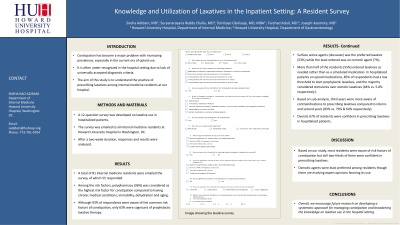Back


Poster Session D - Tuesday Morning
Category: Functional Bowel Disease
D0264 - Knowledge and Utilization of Laxatives in the Inpatient Setting: A Resident Survey
Tuesday, October 25, 2022
10:00 AM – 12:00 PM ET
Location: Crown Ballroom

Has Audio

Sneha Adidam, MD
Howard University Hospital
Washington, DC
Presenting Author(s)
Sneha Adidam, MD, Suryanarayana Reddy Challa, MD, Temitayo Gboluaje, MD, MBA, Joseph Asemota, MD, Gagan Singh, MD, Farshad Aduli, MD
Howard University Hospital, Washington, DC
Introduction: Constipation has become a major problem with increasing prevalence, especially in the current era of opioid use. It is often under-recognized in the hospital setting due to lack of universally accepted diagnostic criteria. The aim of this study is to understand the practice of prescribing laxatives among internal medicine residents at our hospital.
Methods: A 12-question survey was developed on laxative use in hospitalized patients. The survey was emailed to all internal medicine residents at a university hospital center in Washington, DC. After a two-week duration, responses and results were analyzed.
Results: A total of 81 internal medicine residents were emailed the survey, of which 55 responded. Among the risk factors, polypharmacy (36%) was considered as the highest risk for constipation compared to having chronic medical conditions, immobility, dehydration and aging. Although 93% of respondents were aware of the common risk factors of constipation, only 63% were cognizant of prophylactic laxative therapy. Surface active agents (docusate) was the preferred laxative (53%) while the least ordered was an osmotic agent (7%). More than half of the residents (55%) ordered laxatives as needed than as a scheduled medication. In hospitalized patients on opioid medications, 85% of respondents had a low threshold to start prophylactic laxatives, and the majority considered stimulants over osmotic laxatives (44% vs. 5.8% respectively). Based on sub-analysis, third years were more aware of contraindications to prescribing laxatives compared to interns and second years (83% vs. 76% & 64% respectively). Overall, 67% of residents were confident in prescribing laxatives in hospitalized patients.
Discussion: Based on our study, residents were aware of risk factors of constipation but still two-thirds of them were not confident in prescribing laxatives. Osmotic agents were least preferred among residents though there are evolving expert opinions favoring its use. Overall, we encourage future research on developing a systematic approach for managing constipation and broadening the knowledge on laxative use in the hospital setting.
Disclosures:
Sneha Adidam, MD, Suryanarayana Reddy Challa, MD, Temitayo Gboluaje, MD, MBA, Joseph Asemota, MD, Gagan Singh, MD, Farshad Aduli, MD. D0264 - Knowledge and Utilization of Laxatives in the Inpatient Setting: A Resident Survey, ACG 2022 Annual Scientific Meeting Abstracts. Charlotte, NC: American College of Gastroenterology.
Howard University Hospital, Washington, DC
Introduction: Constipation has become a major problem with increasing prevalence, especially in the current era of opioid use. It is often under-recognized in the hospital setting due to lack of universally accepted diagnostic criteria. The aim of this study is to understand the practice of prescribing laxatives among internal medicine residents at our hospital.
Methods: A 12-question survey was developed on laxative use in hospitalized patients. The survey was emailed to all internal medicine residents at a university hospital center in Washington, DC. After a two-week duration, responses and results were analyzed.
Results: A total of 81 internal medicine residents were emailed the survey, of which 55 responded. Among the risk factors, polypharmacy (36%) was considered as the highest risk for constipation compared to having chronic medical conditions, immobility, dehydration and aging. Although 93% of respondents were aware of the common risk factors of constipation, only 63% were cognizant of prophylactic laxative therapy. Surface active agents (docusate) was the preferred laxative (53%) while the least ordered was an osmotic agent (7%). More than half of the residents (55%) ordered laxatives as needed than as a scheduled medication. In hospitalized patients on opioid medications, 85% of respondents had a low threshold to start prophylactic laxatives, and the majority considered stimulants over osmotic laxatives (44% vs. 5.8% respectively). Based on sub-analysis, third years were more aware of contraindications to prescribing laxatives compared to interns and second years (83% vs. 76% & 64% respectively). Overall, 67% of residents were confident in prescribing laxatives in hospitalized patients.
Discussion: Based on our study, residents were aware of risk factors of constipation but still two-thirds of them were not confident in prescribing laxatives. Osmotic agents were least preferred among residents though there are evolving expert opinions favoring its use. Overall, we encourage future research on developing a systematic approach for managing constipation and broadening the knowledge on laxative use in the hospital setting.
Disclosures:
Sneha Adidam indicated no relevant financial relationships.
Suryanarayana Reddy Challa indicated no relevant financial relationships.
Temitayo Gboluaje indicated no relevant financial relationships.
Joseph Asemota indicated no relevant financial relationships.
Gagan Singh indicated no relevant financial relationships.
Farshad Aduli indicated no relevant financial relationships.
Sneha Adidam, MD, Suryanarayana Reddy Challa, MD, Temitayo Gboluaje, MD, MBA, Joseph Asemota, MD, Gagan Singh, MD, Farshad Aduli, MD. D0264 - Knowledge and Utilization of Laxatives in the Inpatient Setting: A Resident Survey, ACG 2022 Annual Scientific Meeting Abstracts. Charlotte, NC: American College of Gastroenterology.

